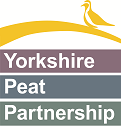As Yorkshire Peat Partnership (YPP) heads into the new restoration season, we take a moment to celebrate our achievements from the previous (2020-2021) season with our annual report.
In our 2020-2021 season, we:
- brought over 5,000 hectares of peatland into restoration management
- blocked 156 km of eroding grips and gullies
- planted over 76,000 sphagnum moss plugs, 132,000 crowberry plugs and 173,000 cottongrass plugs
- surveyed over 6,500 hectares of peatland on foot
This important work helps to re-establish healthy blanket bog in Yorkshire’s drained and damaged uplands. As well as helping to hold water and peat on the moors and keeping millennia of carbon locked in the ground, this provides valuable habitat for some fascinating and beautiful wildlife.
By replanting our peatlands with native bog vegetation, we stabilise the peat and protect it from erosion; we create wet conditions that allow important food species like cranefly to thrive, supporting the food web; we produce cover for ground nesting birds and shelter for invertebrates; we connect wild networks that allow species like otters to move between river catchments.
Yorkshire Wildlife Trust’s Peat Programme Manager, Dr Tim Thom said:
“Blanket bog covers around 96,000 hectares in North Yorkshire – our restoration work is making so much space for nature to survive and thrive. Ecosystem services are an important consideration but when we discuss wild places purely in terms of the benefits they afford us, we diminish them. Our beautiful Yorkshire blanket bogs are worth looking after.
Global Peatlands Initiative coordinator Dianna Kopansky commented:
“It is wonderful to see peatlands being recognised and valued for all the roles they play as a holistic ecosystem. This work by YPP to restore Yorkshire’s blanket bogs is so important not just for Yorkshire, but in developing and demonstrating restoration techniques and best practice that can be used across geographies.”
This release is part of the Global Peat Press Project (GP3) campaign, bringing together international partners to highlight the importance of peatlands as vulnerable but valuable ecosystems. It is a coordinated media outreach from the UNEP’s Global Peatlands Initiative (GPI) and the North Pennines AONB Partnership to promote the UN Decade on Ecosystem Restoration (2021-2030). It was conceived to raise awareness and enthusiasm about the role of peatlands in climate action in the run-up to the UNFCCC COP26 in November, and has now pivoted to focus on the vital importance of peatlands for nature, aiming to build momentum and interest in advance of the Convention on Biological Diversity (CBD) COP15 in April next year.
